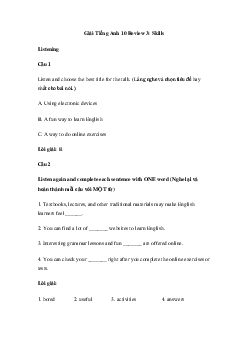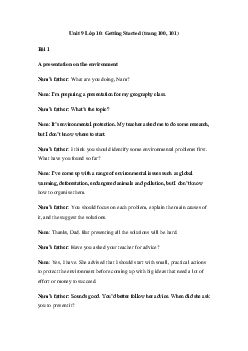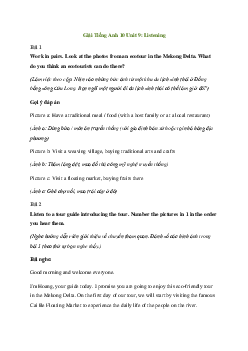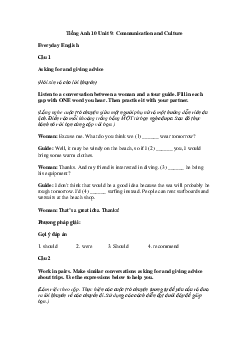









Preview text:
UNIT 9: PRESERVING ENVIRONMENT I. PHONETICS
1. Put the right mark of stress (') on these words. The number 0 has been done for you as an example. Words
Words with mark of stress 0. countryside 0. 'countryside 1. animal 1. 2. elephant 2. 3. library 3. 4. computer 4. 5. character 5.
2. Which syllable usually has stress mark in the words with three syllable? The first
syllable, the second or third?
................................................................................................................................................
- Do you realize the general rule?
................................................................................................................................................ II. VOCABULARY
1. Give the noun of these verb. Verb Noun 1. preserve 1. 2. advise 2. 3. protect 3. 4. deforest 4. 5. pollute 5. 6. consume 6. 7. contaminate 7. 8. reduce 8. 9. increase 9. 10. deplete 10.
2. Complete the sentences with the words in 1. (Remember to give the correct form of the verb). 1.
is destroying large areas of tropical rain forest.
2. The doctor advise him not to any more.
3. Car exhaust is the main reason for the city's . 4. Vitamin C may help against cancer. 5. This car lots of fuel each year. 6. If we continue to
the Earth's natural resources, we will cause serious damage to the environment.
7. The water supply is being tested for .
8. Life expectancy in Europe has greatly in the 20th century.
9. The Green Party have called for a substantial in the emission of greenhouse gases by the UK.
10. There is great public concern about some of the chemicals used in food . Trang 1 III. GRAMMAR 1. Report the sentences.
1. Mark: I‟m taking my driving test tomorrow.
Mark said he was taking his driving test the next day.
2. Jane to Tom: You play very well.
3. Sue: I left school a year ago.
4. Charlie to Helen: I haven‟t seen Diana recently.
5. Rachel to us: You can come and stay at my flat if you are in London.
6. John to us: I don‟t know where Fred is.
7. Matthew: My car was stolen last week.
8. Judy: I want to go on holiday but I can‟t afford it.
9. Emma: I‟ve only had the new computer since yesterday.
10. Sarah to me: I‟m going away for a few days. I‟ll phone you when I get back.
II. Write the reported sentence. Beginning He asked (me)/ wondered/ wanted to know.
1. What‟s Peter‟s address?
He asked me what Peter’s address was. 2. Do they like me? 3. Where do you live?
4. Have you got a driving license? 5. How does she know my name?
6. When is the new manager coming?
7. Can you lend me some money? 8. Why did you come back? 9. Will I be ready in time?
10. Do you have any plans for a holiday?
III. Choose the correct answer.
1. Hello, Jim. I didn‟t expect to see you today. Solia said you ill. Trang 2 a.. are b. were c. was d. should be
The last time I saw Jonathan, he looked very relaxed. He explained that he on holiday the previous week. a. was b. has been c. would be d. had been
I rang my friend in Australia yesterday, and she said it there. a. is raining b. rained c. was raining d. would rain What did that man say ? a. at you b. for you c. to you d. you 5. Ann and left. a. said goodbye to me b. said me goodbye c. told me goodbye d. goodbye me 6. The librarian asked us so much noise. a. don‟t make b. not make c. not making d. not to make 7. Someone the tickets are free. a. said me b. said me that c. told to me d. told me 8. I wonder the tickets are on sale yet? a. whether b. what c. where d. when 9. She asked me how long in my present job. a. I had been working b. I have been working c. had I been working d. have I worked 10. He said he would do it . a. yesterday b. the following day c. the previous day d. the day before 11. He proved that the earth round the sun. a. had gone b. was going c. goes d. would go
12. I don‟t know why Susan didn‟t go to the meeting. She said she . a. will definitely go b. was definitely going c. had definitely gone d. would definitely going
13. The government has announced that taxes . a. would be raised b. had been raised c. were raised d. will be raised 14. I told you the computer, didn‟t I? a. to switch off b. don‟t switch off c. not switch off d. switch off
15. When I rang Tessa some time last week, she said she was busy . a. that day b. the day c. today d. this day
16. When he was at Oliver‟s flat yesterday, Martin asked if he use the phone. a. can b. could c. may d. must 17. She said she
the next week, but I never saw her again. a. will be back b. had been back c. would be back d. is going to be back
18. Someone was wondering if the taxi yet. a. had arrived b. arrived c. arrives d. has arrived
19. Claire wanted to know what time . a. do the banks close b. did the bank dose b. the banks closed d. the banks would dose Trang 3 20. Judy suggested
for a walk, but no one else wanted to. a. to go b. go c. going d. went
IV. Complete the replies. The second speaker is surprised at what he or she hears.
1. A: Emma and I are getting married.
B: Really? But you said last week you weren’t getting married.
2. A: I like pop music more than classical music. B: I‟m sure you told me best.
3. A: I can speak a little Japanese.
B: Can you? I thought you said 4. A: I‟m on a diet. B: But you told me
5. A: I haven‟t finished my project.
B: Haven‟t you? I thought you said
6. A: I‟m applying for the job. B: I thought you told me
7. A: My sister enjoys parties.
B: Surely I remember you saying
8. A: I‟ll be here next week. B: But you said yesterday
9. A: I had a job interview yesterday.
B: Did you? I thought you told me two days before.
10. A: We haven‟t been to the cinema for ages.
B: Haven‟t you? I thought you said last week.
V. Choose one of these to complete each sentence below. Use reported speech.
Don‟t wait for me if I‟m late. Stay in bed for a few days.
Can you open your bag, please. Please slow down!
Don‟t touch the electric wires! Don‟t worry. Sue. Will you marry me? Hurry up!
Would you like to stay for dinner, Claire? Shall we join an poetry club?
Could you repeat what you said, please? We‟ll pay for the damage.
Would you mind turning the music down? Do you think you could give
Please don‟t tell anybody what happened. me a hand, Tom?
1. Bill was taking a long time to get ready, so I told him to hurry up.
2. Sarah was driving too fast, so I asked .
3. Sue was pessimistic about the situation, so I told .
4. The foremen walked towards the children and warned .
5. I couldn‟t move the piano alone, so I asked .
6. The customs officer looked at me suspiciously and asked .
7. Jim knocked his neighbors‟ door and asked .
8. I had difficulty understanding him, so I told .
9. It was time for dinner, so I invited .
10. I didn‟t want to delay Ann, so I told .
VI. Report the sentences. They were all spoken last week. Use the verbs in brackets.
1. Laura: Can you move this table, please? (tell) Trang 4
2. The police to us: The road were dangerous. (warn)
3. The builders: Everything will be ready on time. (promise)
4. The tourist: Which way is the post office? (ask)
5. Ann to Janet: Don‟t forget to sign the form. (remind)
6. Bernard to his wife: Have you seen my car keys? (wonder)
7. The policeman to Christ: Stop the car. (order)
8. Tessa: It was me. I ate all the cake yesterday. (admit)
9. Adrian: I‟m sorry I was rude, (apologize)
10. Simon to Susan: Would you and Melanie like to come to my party? (invite) IV. READING
1. Read the passage carefully and choose the correct answer.
We live in a dynamic world, and habitats are always undergoing changes at all sorts of
levels. However, natural changes usually occur at a slow pace so that impacts on individual
species tend to be slight - at least in the short term. When the pace of change is greatly
accelerated, there may be no time for individual species to react to new circumstances, and
the effects can be disastrous. Briefly, this is the reason that rapid habitat loss is regarded as
the chief cause of species endangerment, and there is no force more powerful in this regard
than human beings. To some extent, every part of the earth has been affected by human
activities, especially during this past century. This applies on virtually every scale, from the
loss of microbes in soils that once supported tropical forests, to the extinction of fish and
other aquatic species in polluted freshwater habitats, to changes in global climate caused by
the release of greenhouse gases.
From the perspective of an individual human lifetime, such changes may be hard to detect
and their effects on individual species may be hard to predict. But the lesson is clear enough.
For example, although many countries have had plans to grow many tropical forests, they are
highly susceptible to destruction because the soils in which they grow are poor in available
nutrients. Centuries may be required to bring back a forest that was cut down or burnt out in
the space of a few years. Many of the world's severely threatened animals and plants live in
such forests, and it is certain that huge numbers of them will disappear if present rates of forest loss continue.
1. Habitats in the world are unchangeable and fixedly exist. a. True b. False c. No information
2. All species can adapt themselves to new circumstances easily and quickly. a. True b. False c. No information
3. Human beings are the main cause that leads to rapid habitat loss. a. True b. False c. No information
4. Many kinds of fish are also in danger of extinction because water habitats are polluted. a. True b. False c. No information Trang 5
5. Many countries have grown as many tropical forests as they destroyed in the past years, a. True b. False c. No information
2. Fill in each numbered blank with one suitable word or phrase.
The World Wide Fund for Nature (WWF) is an international (1) - governmental
organization for the (2) , research, and restoration of the environment. The organization was (3)
as a charitable trust on September 11, 1961, in Morges, Switzerland, under
the name World Wildlife Fund. It was an initiative of Julian Huxley and Max Nicholson.
It is the world's largest independent conservation organization with over 5 million (4)
worldwide, working in more (5) 90 countries, supporting 100 conservation and
environmental projects around the world. It is a charity, with (6) 9% of its funding coming from voluntary. (7)
by private individuals and businesses.
The group says its mission is "to halt and reverse the (8) of our environment".
Currently, much of its work focuses on the conservation of three biomes, that contain most of
the world's biodiversity: forests, freshwater ecosystems, and oceans and coasts. Among other
issues, it is also concerned (9) endangered species, pollution, and climate change. The
organization (10) , more than 20 field projects worldwide. In the last few years, the
organization set up offices and operations around the world. 1. a. non b. not c. no d. nor 2. a. challenge b. keeping c. conversation d. awareness 3. a. produced b. discovered c. used d. formed 4. a. supporters b. residents c. inhabitants d. citizens 5. a. as b. than c. to d. as to 6. a. generally b. individually c. commercially d. approximately 7. a. deposits b. donations c. refunds d. loans 8. a. destroy b. destructive c. destruction d. destroyed 9. a. on b. by c. with d. upon 10. a. goes b. walks c. reaches d. runs V. SPEAKING
1. Look at the picture and write the type of pollution.
1. .................................................................
2. ................................................................
3. .................................................................
4. ................................................................
2. List some causes and consequences of pollutions then make a short talk about pollution.
Report your answer in oral speech and record your talk.
www.thuvienhoclieu.com Trang 6 Causes Consequences
- ........................................................................
- ........................................................................
- ........................................................................
- ........................................................................
- ........................................................................
- ........................................................................
- ........................................................................
- ........................................................................
- ........................................................................
- ........................................................................
- ........................................................................
- ........................................................................ VI. WRITING
1. List five things to reduce the pollution.
- .............................................................................................................................................
- .............................................................................................................................................
- .............................................................................................................................................
- .............................................................................................................................................
- .............................................................................................................................................
2. Do you think that we should protect our natural environment? What should we do to
protect it? Write a short paragraph about this. Using the ideas in 1 as suggestions for you. ĐÁP ÁN
UNIT 9: PRESERVING ENVIRONMENT I. PHONETICS
1. Put the right mark of stress (') on these words. The number 0 has been done for you as an example. Words
Words with mark of stress 1. animal 1. 'animal 2. elephant 2. 'elephant 3. library 3. 'library 4. computer 4. 'computer 5. character 5. 'character
2. Which syllable usually has stress mark in the words with three syllable? The first
syllable, the second or third? - The first syllable
- Nouns which have three syllables usually has stress on the first syllable. II. VOCABULARY
1. Give the noun of these verb. 1. preservation 6. consumption
www.thuvienhoclieu.com Trang 7 2. advice 7. contamination 3. protection 8. reduction 4. deforestation 9. increase 5. pollution 10. depletion
2. Complete the sentences with the words in 1. (Remember to give the correct form of the verb).
1. Deforestation 2. advise 3. pollution 4. protect 5. consume 6. deplete 7. contamination 8. increased 9. reduction 10. preservation III. GRAMMAR 1. Report the sentences.
2. Jane told Tom (that) he played very well.
3. Sue said (that) she left/ had left school a year before.
4. Charlie told Helen (that) he hadn‟t seen Diana recently.
5. Rachel told us (that) we could come and stay at her flat if we were in London.
6. John told us (that) he didn‟t know where Fred was.
7. Matthew said (that) his car was stolen/ had been stolen the week before.
8. Judy said she wanted to go on holiday but she couldn't afford it.
9. Emma said (that) she had only had the new computer since the previous day.
10. Sarah told me (that) she was going away for a few days and she would phone me when she got back.
II. Write the reported sentence. Beginning He asked (me)/ wondered/ wanted to know.
2. He wondered if/ whether they liked him.
3. He wanted to know where I lived.
4. He asked me if/whether I had/ had god a driving license.
5. He wanted to know how she knew his name.
6. He asked (me) when the new manager was conning.
7. He asked me if/ whether I could lend him some money.
8. He wanted to know why I came/ had come back.
9. He wondered if/ whether he would be ready in time.
10. He asked me if/ whether I had any plans for a holiday.
III. Choose the correct answer. l. b 2. d 3. c 4. c 5. a 6. d 7. d 8. a 9. a 10. b 11. c 12. b 13. d 14. a 15. a 16. b 17. c 18. d 19. b 20. c
IV. Complete the replies. The second speaker is surprised at what he or she hears. 2. you liked classical music
3. you couldn‟t speak (any) Japanese. 4. you weren‟t on a diet.
5. you had finished it/ your project
6. you weren‟t applying for it/ the job.
7. she didn‟t enjoy them/ parties.
8. you wouldn‟t be here next week.
9. you had I had had a job interview
10. you had been to the cinema/ you went to the cinema
V. Choose one of these to complete each sentence below. Use reported speech.
www.thuvienhoclieu.com Trang 8 2. her to slow down 3. her not to worry
4. them not to touch the electric wires 5. Tom to give me a hand 6. me to open my bag
7. them to turn the music down 8. him to repeat what he said 9. Claire to stay for dinner
10. her not to wait for me if I was late
VI. Report the sentences. They were all spoken last week. Use the verbs in brackets.
1. Laura told me to move this/ that table.
2. The policeman warned us (that) the road were/ had been dangerous.
3. The builders promised (that) everything would be ready on time.
4. The tourist asked which way was the post office./ The tourist asked which way the post office was.
5. Ann reminded Janet to sign the form.
6. Bernard wondered if/ whether his wife had seen his car keys.
7. The police ordered Christ to stop the car.
8. Tessa admitted eating all the cake the day before/ the previous day.
8. Adrian apologized for being rude.
10. Simon invited Susan and Melanie to come to his party. IV. READING
1. Read the passage carefully and choose the correct answer. l. b 2. b 3. a 4. a 5. c
2. Fill in each numbered blank with one suitable word or phrase. l. a 2. c 3. d 4. a 5. b 6. d 7. b 8. c 9. c 10. d V. SPEAKING
1. Look at the picture and write the type of pollution. 1. water pollution 2. soil pollution 3. air pollution 4. noise pollution
2. List some causes and consequences of pollutions then make a short talk about pollution.
Report your answer in oral speech and record your talk.
Suggested answer (Câu trả lời gợi ý) Causes Consequences - burning of fossil fuels
- respiratory and heart problems - agricultural activities - global warming
- exhaust from factories and industries - acid rain mining operations
- disappearance of wildlife animals and rain - household waste forest - depletion of ozone layer VI. WRITING
1. List five things to reduce the pollution.
Suggested answer (Câu trả lời gợi ý)
- Cycle instead of driving
- Use reusable items instead of disposable items
www.thuvienhoclieu.com Trang 9
- Turn off light and water when they are not in use
- Use energy saving light bulbs
- Use used items instead of buying new ones
2. Do you think that we should protect our natural environment? What should we do to
protect it? Write a short paragraph to support your opinion.
Suggested answer (Câu trả lời gợi ý)
I think that protecting the environment is the responsibility of all the people in the world. We
need to act out some things before it‟s too late. In my opinion, I‟d like to share you some
possible solution for this problem.
- Use public mode of transportation: Encourage people to use more and more public modes of
transportation to reduce pollution.
- Save energy: Switch off fans and lights when you are going out. Large amount of fossil fuels
are burnt to produce electricity. You can save the environment from degradation by reducing the
amount of fossil fuels to be burned.
- Understand the concept of Reduce, Reuse and Recycle: Do not throw away items that are of no
use to you. In-fact reuse them for some other purpose. For e.g. you can use old jars to store cereals or pulses.
- Emphasis on clean energy: Clean energy technologies like solar, wind and geothermal are more
and more popular. Government should encourage and favour the people to use it.
- Use electric saving devices: This is a simple and effective that all of us can do right now.
Several attempts are being made on a personal, industrial and governmental levels to save our
environment in the world now. You and me, we need to contribute to save our green planet.
www.thuvienhoclieu.com Trang 10




